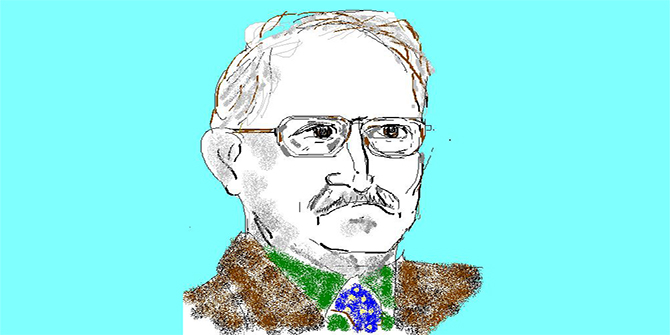 A political party is an entity that outlives the contribution of a particular set of individuals; partisanship is a long-term, cumulative activity. The challenge for the Labour Party is how to retain this sense of the party as a long-term association as it opens up to a larger supporter base and more fluid form of association, writes Jonathan White.
A political party is an entity that outlives the contribution of a particular set of individuals; partisanship is a long-term, cumulative activity. The challenge for the Labour Party is how to retain this sense of the party as a long-term association as it opens up to a larger supporter base and more fluid form of association, writes Jonathan White.
One of the tropes of the Labour Party’s leadership election has been the frequent appeal to the authority of the party’s past. Jeremy Corbyn has talked of the importance of being ‘true to the roots of the party’, while his supporters speak of ‘reclaiming’ it from the Blair years. Founding figures such as Keir Hardie are invoked from all sides as a way to connect today’s issues with yesterday’s cause. Far from being the preserve of the lonely political dinosaur, the party’s history seems to be the stamping ground of the many.
It is easy to dismiss such moves as merely rhetorical – an attempt to put speakers in a favourable light and dignify present debates. Here as elsewhere, history can be used and abused. It is clear that appeals to the past are often tactical – a way of positioning oneself on an issue. But there seems to be something deeper here too. This invocation of the past arguably goes to the heart of what a party is, as a continuing entity that outlives the contribution of a particular set of individuals. It also highlights some of the challenges a party faces as it opens up to a larger supporter base.
A party is often described as a vehicle for winning elections. Its members are said to be in it largely for the spoils of office. While that may sometimes be true, what this view misses is the distinct temporality of the practice. Partisanship is a long-term, cumulative activity. A party typically defines itself by goals that cannot be realised in the short term but that require patience and constancy across time – in Labour’s case including notions of equality, justice, and collective responsibility. What is more, a party pursues such goals through the relatively slow mechanisms of political institutions – in contrast to more immediate forms of protest such as strikes and boycotts. The party is the organised expression of a tradition, built up over time and projected into the future.
This is important because it bears on the reasons for which individuals might associate with a party. The material benefits tend to be small, at least for most members, most of the time. Rather than as a means of personal advancement, partisan affiliation is better seen as a form of commitment grounded in the satisfaction of contributing to a larger, longer project. It depends on the expectation that today’s activities will continue into the future, and draws nourishment from the idea they are the extension of earlier struggles. Appeals to the party’s past express this intergenerational nature of the association. Indeed, there is a sense in which partisans owe a duty of fidelity to the commitments of their predecessors, as those who nurtured the party they now inherit. To invoke the past in this context is to honour the future-oriented actions of those predecessors.
It is natural enough then that the Labour leadership election should feature appeals to the party’s history. Alongside the strategic questions of who can best unify the party, and the desirability of a particular set of policies taken in isolation, there is a reasonable concern about how the present squares with a longer tradition, a concern that arguably taps something essential about the ethics of partisanship. The point is generally overlooked by those who suggest the decisive criterion for assessing leadership candidates should always be their ‘electability’ in a General Election. Of course, it goes without saying that there will be competing interpretations of what forms the core of a party’s tradition – whether, for instance, Corbyn or Kendall better reflects it, and who is better placed to extend it under present conditions. How to channel a tradition is often a point of debate.
The larger challenge for the Labour Party – and for others like it across Europe and beyond – is how to retain this sense of the party as a long-term association while embracing the more participative model of recent weeks. ‘Labour is a social movement or it is nothing,’ Corbyn has said, and the party seems to have drawn new vitality from the expansion of its activist base, excited talk of ‘entryism’ aside. But the temporality of a social movement may be different from that of a party. Whereas the one is about tradition and long-term projects, the other – as a more fluid and issue-specific association – is typically about immediacy and spontaneity. It is about action rooted in the present, relatively detached from a collective past and future.
To be sure, many of the newcomers to Labour may be in it for the long term and concerned precisely to reconnect the party with its past. The Corbyn phenomenon speaks partly to the enduring appeal of siding with a principled tradition. But for those who embrace the movement ethic, the attachments may be correspondingly different. In pioneering more fluid forms of association, parties will need to be careful not to weaken the cross-temporal outlook on which the partisan model depends.
These arguments are developed in more detail in the author’s recent article ‘The Party in Time’ in the British Journal of Political Science, and in a forthcoming book with Lea Ypi on The Meaning of Partisanship.
About the Author
 Jonathan White is Associate Professor (Reader) in European Politics at the London School of Economics. He gained his doctorate at the European University Institute (EUI) in Florence, and has been a visiting scholar at Harvard, University College London, the Humboldt University, Sciences Po in Paris, the Australian National University, and the Institute of Advanced Study in Berlin. His work has appeared in American Political Science Review, Journal of Politics, Political Studies, Journal of Common Market Studies, British Journal of Sociology and British Journal of Political Science.
Jonathan White is Associate Professor (Reader) in European Politics at the London School of Economics. He gained his doctorate at the European University Institute (EUI) in Florence, and has been a visiting scholar at Harvard, University College London, the Humboldt University, Sciences Po in Paris, the Australian National University, and the Institute of Advanced Study in Berlin. His work has appeared in American Political Science Review, Journal of Politics, Political Studies, Journal of Common Market Studies, British Journal of Sociology and British Journal of Political Science.








To be effective, any systematic approach to really effective modern politics must incorporate systematic feedback as an integral part of all supply procedures..